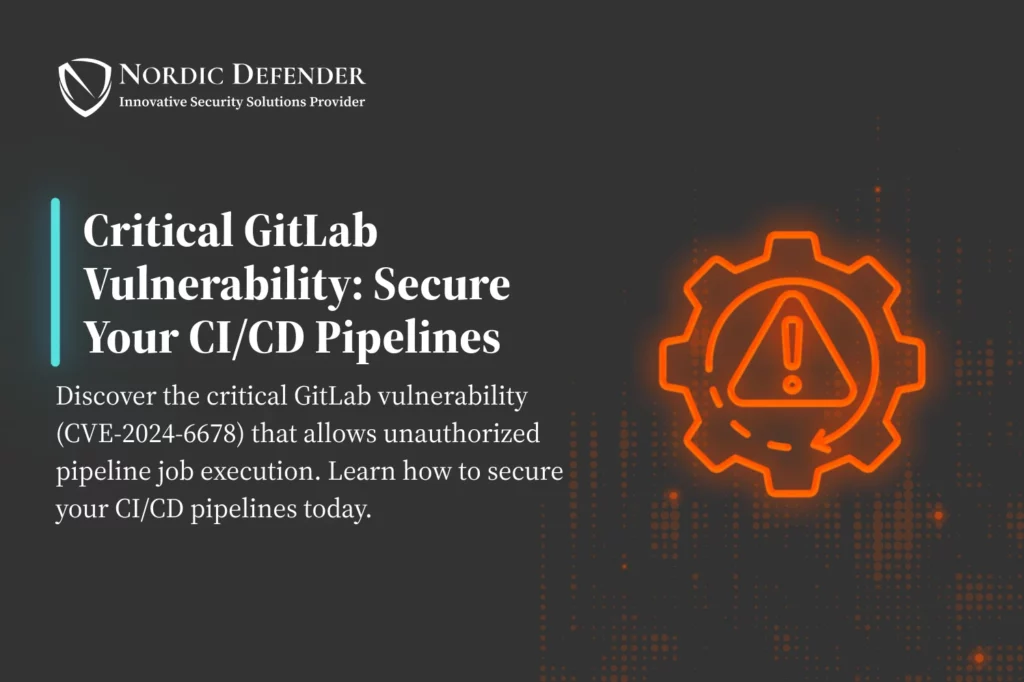In a significant announcement, GitLab recently patched a critical vulnerability (CVE-2024-6678) with a severity score of 9.9, which allows unauthorized users to execute pipeline jobs. This issue affects a vast range of GitLab versions from 8.14 to 17.3.1, posing a serious risk to organizations that depend on GitLab for their CI/CD pipelines.
The flaw may seem narrowly technical, but its ramifications are profound. Continuous Integration/Continuous Deployment (CI/CD) pipelines have become the cornerstone of modern software development, automating the process of building, testing, and deploying code. Any unauthorized manipulation of these pipelines can be catastrophic. By gaining access to execute pipeline jobs, an attacker could potentially inject malicious code into production environments, tamper with sensitive data, or even disrupt entire software release processes.
Moreover, pipelines are often integrated with other crucial systems such as cloud environments, third-party APIs, and repositories. A breach in the pipeline could serve as a gateway for lateral movement, where attackers gain access to other connected systems within the enterprise. This is why GitLab’s proactive patching of this vulnerability is so essential, even though no active exploitation has been detected yet.
Why This Matters for Security Professionals
Beyond simply applying the latest patches, security teams should use this incident as a reminder of the importance of securing CI/CD pipelines comprehensively. It’s not just about the source code itself but also the entire build and deployment process. Here are some key takeaways for deeper defense:
- Regular Auditing and Monitoring of Pipelines: Every component of your CI/CD pipeline should be regularly audited. This includes source code repositories, build tools, deployment scripts, and cloud configurations. Continuous monitoring for unauthorized activity is equally important, especially in environments as dynamic as modern DevOps setups.
- Access Controls and Segmentation: Limit the permissions of users who have access to CI/CD systems. Unauthorized pipeline job execution, as seen in this GitLab vulnerability, can be mitigated by ensuring that only trusted personnel have such access. Segregating duties and ensuring that only specific, trusted service accounts or teams can run or modify pipeline jobs is essential.
- Automated Patch Management: This incident underscores the necessity of maintaining a rigorous, automated patch management system. Organizations should prioritize high-severity vulnerabilities and critical systems like GitLab to ensure swift remediation.
- Incident Response and Threat Modeling: Even with patches in place, organizations should regularly update their threat models and incident response plans. Consider what could happen if a malicious actor were to exploit CI/CD vulnerabilities and build contingencies for such a scenario. Security professionals should ensure that plans include a step for rapidly responding to compromised build pipelines, with automated mechanisms to roll back or quarantine malicious changes.
Nordic Defender’s Recommendations
At Nordic Defender, we’ve observed that the complexity and interconnectivity of modern DevOps environments require a holistic approach to cybersecurity. Patch management is just one aspect of a larger defense strategy. For comprehensive protection, we recommend integrating CI/CD pipeline monitoring tools that can detect anomalies in build processes, utilizing automated vulnerability scanning, and adopting the principle of least privilege (PoLP) in access management.
Our solutions provide full-cycle vulnerability management, from identifying and prioritizing vulnerabilities to applying timely patches. If your organization uses GitLab or similar CI/CD tools, our team can help assess the security of your pipelines and assist in setting up continuous monitoring and response systems.
For assistance with securing your CI/CD environments or general cybersecurity inquiries, reach out to our expert team at Nordic Defender. Safeguard your development lifecycle, and stay ahead of potential cyber threats.
Final Thoughts
The GitLab vulnerability serves as a stark reminder that even highly trusted tools are not immune to security risks. As organizations increasingly rely on automated systems, cybersecurity must be embedded in every aspect of development and deployment. Staying vigilant and proactive will help ensure that vulnerabilities when discovered, are mitigated before they can be exploited.
Stay secure, and ensure your DevOps pipelines are fortified against both present and future threats.
